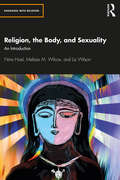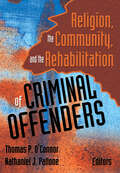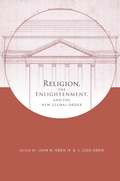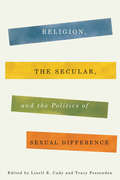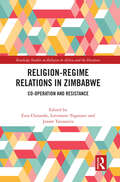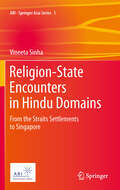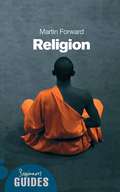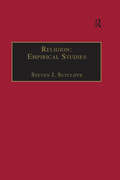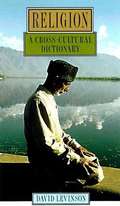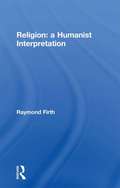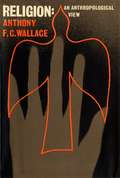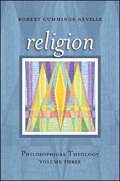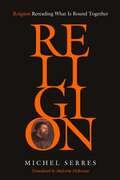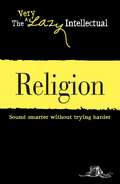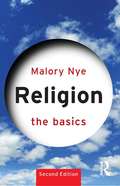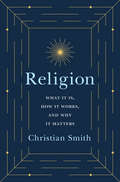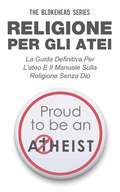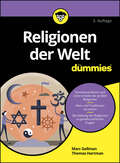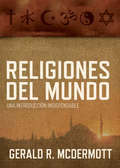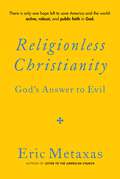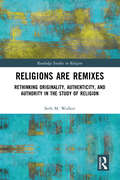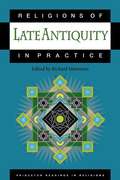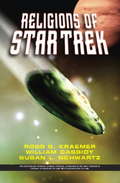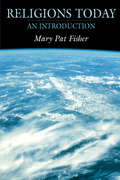- Table View
- List View
Religion, the Body, and Sexuality: An Introduction (Engaging with Religion)
by Melissa M. Wilcox Liz Wilson Nina HoelHow does religion relate to bodies and sexualities? Many people would answer, simply, "through repression," but the relationship is much more complicated than that. While many religions draw boundaries between what they consider to be appropriate and inappropriate use of the human body, especially in the realm of sexuality, the same religions often celebrate human sexuality and even expect sexual partners to provide each other with sexual pleasure. Celibacy, too, is more than just repression, and sometimes it is even seen as providing the practitioner with great spiritual power; in other settings, the sex act itself is understood to provide this power. Religion, the Body, and Sexuality offers students and general readers a sophisticated and accessible exploration of the connections between religion, sexuality, and the body, through case studies and overviews in the following thematic chapters: Celibacy Regulation Controversy Violence Innovation Instrumentalization Ecstasy Each chapter includes suggestions for further reading, questions for further thought, and a list of relevant media resources. This engaging book is an excellent addition to introductory courses on religion or sexuality and is a much-needed new volume for advanced courses on the intersections of these areas of human experience.
Religion, the Community, and the Rehabilitation of Criminal Offenders
by Thomas P O'ConnorExplore the relationship between faith-based programs, religion, and offender rehabilitation! This book reports on current research from several disciplines to help the reader understand the nature and impact of the relationship between faith-based programs, religion, and offender rehabilitation. Religion, the Community, and the Rehabilitation of Criminal Offenders is a unique resource-there has been very little research published on this important topic. President Bush's faith-based initiative recognized that religion plays a role in the justice system and corrections that is overlooked but essential-it increases the role of community and caring in the system in a unique and important way. This pathbreaking book points the way toward a system of faith-based programs that are not only effective but also economical, as these programs are often staffed by volunteers. Religion, the Community, and the Rehabilitation of Criminal Offenders addresses important questions regarding the importance and effectiveness of faith-based rehabilitation programs, including: What is the relationship between prison religion and offender rehabilitation? What motivates inmates to become involved with religious programs and activities? What is the prison chaplain's role in rehabilitation? Are certain religious denominations more effective than others in preventing crime, delinquency, and recidivism? How does religious activity help inmates adjust to the prison environment? What do inmates have to say about the religious programs they encounter within the system? How did Islam develop within American correctional institutions and what changes has the movement gone through in recent years? Why do female African-American inmates tend to resist conversion to Islam while their male counterparts embrace the Muslim faith in increasing numbers? How can sacred texts and social theory be utilized as teaching tools and intervention strategies in the transformation processes of men incarcerated for violent crimes? (A fascinating study from the Sing-Sing prison) and more!
Religion, the Enlightenment, and the New Global Order (Columbia Series on Religion and Politics)
by J. Owen John Owen IvLargely due to the cultural and political shift of the Enlightenment, Western societies in the eighteenth century emerged from sectarian conflict and embraced a more religiously moderate path. In nine original essays, leading scholars ask whether exporting the Enlightenment solution is possible-or even desirable-today. Contributors begin by revisiting the Enlightenment's restructuring of the West, examining its ongoing encounters with Protestant and Catholic Christianity, Judaism, Islam, and Hinduism. While acknowledging the necessity of the Enlightenment emphasis on toleration and peaceful religious coexistence, these scholars nevertheless have grave misgivings about the Enlightenment's spiritually thin secularism. The authors ultimately upend both the claim that the West's experience offers a ready-made template for the world to follow and the belief that the West's achievements are to be ignored, despised, or discarded.
Religion, the Secular, and the Politics of Sexual Difference (Religion, Culture, and Public Life)
by Tracy Fessenden Linell E. CadyGlobal struggles over women's roles, rights, and dress increasingly cast the secular and the religious in tense if not violent opposition. When advocates for equality speak in terms of rights and modern progress, or reactionaries ground their authority in religious and scriptural appeals, both tend to presume women's emancipation is ineluctably tied to secularization. Religion, the Secular, and the Politics of Sexual Difference upsets this certainty by drawing on diverse voices and traditions in studies that historicize, question, and test the implicit links between secularism and expanded freedoms for women. Rather than position secularism as the answer to conflicts over gender and sexuality, this volume shows both religion and the secular collaborate in creating the conditions that generate them.
Religion,Culture and the State
by Pierre Anctil Howard AdelmanThe Canadian principle of reasonable accommodation demands that the cultural majority make certain concessions to the needs of minority groups if these concessions will not cause 'undue hardship.' This principle has caused much debate in Quebec, particularly over issues of language, Muslim head coverings, and religious symbols such as the kirpan (traditional Sikh dagger). In 2007, Quebec Premier Jean Charest commissioned historian and sociologist Gérard Bouchard and philosopher and political scientist Charles Taylor to co-chair a commission that would investigate the limits of reasonable accommodation in that province.Religion, Culture, and the State addresses reasonable accommodation from legal, political, and anthropological perspectives. Using the 2008 Bouchard-Taylor Report as their point of departure, the contributors contextualize the English and French Canadian experiences of multiculturalism and diversity through socio-historical analysis, political philosophy, and practical comparisons to other jurisdictions. Timely and engaging, Religion, Culture, and the State is a valuable resource in the discussion of religious pluralism in Canadian society.
Religion-Regime Relations in Zimbabwe: Co-operation and Resistance (Routledge Studies on Religion in Africa and the Diaspora)
by Lovemore Togarasei Ezra Chitando Joram TarusariraThis book explores religion-regime relations in contemporary Zimbabwe to identify patterns of co-operation and resistance across diverse religious institutions. Using co-operation and resistance as an analytical framework, the book shows how different religious organisations have interacted with Emmerson Mnangagwa’s "Second Republic", following Robert Mugabe’s departure from the political scene. In particular, through case studies on the Zimbabwe Council of Churches, Zimbabwe Catholic Bishops Conference and Pentecostals, African Traditional Religions, Islam, and others, the book explores how different religious institutions have responded to Mnangagwa’s new regime. Chapters highlight the complexities characterising the religion-regime interface, showing how the same religious organisation might co-operate and resist at the same time. Furthermore, the book compares how religious institutions co-operated or resisted Mugabe’s earlier regime to identify patterns of continuity and change. Overall, the book highlights the challenges of deploying simplistic frames in efforts to understand the interface between politics and religion. A significant contribution to global scholarship on religion-regime interfaces, this book will appeal to academics and students in the field of Religious Studies, Political Science, History and African Studies
Religion-State Encounters in Hindu Domains
by Vineeta SinhaThe historical and empirical project presented here is grounded in a desire to theorize 'religion-state' relations in the multi-ethnic, multi-religious, secular city-state of Singapore. The core research problematic of this project has emerged out of the confluence of two domains, 'religion, law and bureaucracy' and 'religion and colonial encounters.' This work has two core objectives: one, to articulate the actual points of engagement between institutions of religion and the state, and two, to identify the various processes, mechanisms and strategies through which relations across these spheres are sustained. The thematic foundations of this book rest on disentangling the complex interactions between religious communities, individuals and the various manifestations of the Singapore state, relationships that are framed within a culture of bureaucracy. This is accomplished through a scrutiny of Hindu domains on the island nation-state, from her identity as part of the Straits Settlements to the present day. The empirical and analytical emphases of this book rest on the author's engagement with the realm of Hinduism as it is conceived, structured, framed and practiced within the context of a strong state in Singapore today. Ethnographically,the book focusses on Hindu temple management and the observance of Hindu festivals and processions, enacted within administrative and bureaucratic frames.
Religion: A Beginner's Guide (Beginner's Guides)
by Martin ForwardThis innovative study proves to the heart of religion, examining issues from the origins of religious belief to life after death.
Religion: A Critical Introduction (Controversial New Religions Ser.)
by Steven J. SutcliffeTreating 'religion' as a fully social, cultural, historical and material field of practice, this book presents a series of debates and positions on the nature and purpose of the 'Study of Religions', or 'Religious Studies'. Offering an introductory guide to this influential, and politically relevant, academic field, the contributors illustrate the diversity and theoretical viability of qualitative empirical methodologies in the study of religions. The historical and cultural circumstances attending the emergence, defence, and future prospects of Religious Studies are documented, drawing on theoretical material and case studies prepared within the context of the British Association for the Study of Religions (BASR), and making frequent reference to wider European, North American, and other international debates and critiques.
Religion: A Cross-Cultural Dictionary
by David LevinsonReligion is about the relationship between human beings and the supernatural world. Of the dozens of definitions of religion that have been suggested by theologians, historians, sociologists, anthropologists, and others, this one cuts to what is common to all religious systems. The term religious system is used here to mean all of the shared religious beliefs and practices that comprise the human-supernatural relationship of a particular indigenous culture or a particular world religion. A world religion is a religious system whose adherents are spread widely around the world and/or a religious system that has significantly influenced other religious systems. The term indigenous religion is used here to mean the religious system of a non-industrialized, non-Western society. This volume focuses on both world religions and indigenous religions. Sixteen major world religions are described in separate entries, a chronology of world religions is provided, and topical entries cover various aspects of world religions such as missionary activity and monotheism. The purpose of these sixteen world religion articles is to provide a basic profile of each religion, with a focus on the official beliefs and practices of each religion.
Religion: A Humanist Interpretation
by Raymond FirthReligion: A Humanist Interpretation represents a lifetime's work on the anthropology of religion from a rather unusual personal viewpoint. Raymond Firth treats religion as a human art, capable of great intellectual and artistic achievements, but also of complex manipulation to serve the human interests of those who believe in it and operate it. His study is comparative, drawing material from a range of religions around the world. Its findings are a challenge to established beliefs. This anthropological approach to the study of religion covers themes ranging from; religious belief and personal adjustment; gods and God; offering and sacrifice;religion and politics; Malay magic and spirit mediumship; truth and paradox in religion.
Religion: An Anthropological View
by Anthony WallaceAn anthropological view of religion by Anthony F. C. Wallace, including sections on general theories on religion, religion as therapy, and religion as a form of expression.
Religion: Philosophical Theology, Volume Three
by Robert Cummings NevilleReligion is the third and final volume in Robert Cummings Neville's systematic development of a new philosophical theology. Unfolding through his earlier volumes, Ultimates and Existence, and now in Religion, philosophical theology considers first-order questions generally treated by religious traditions through philosophical methods while reflecting Neville's long engagement with philosophy, theology, and Eastern and Western religious traditions. In this capstone to the trilogy, Neville provides a theory of religion and presents a sacred worldview to guide religious participation. His philosophical theory of value enlightens religions' approaches to ethics, spirituality, and religious institutional living and collaboration. With a detailed examination of plausibility conditions for sacred worldviews, the book concludes with an exploration of "religionless religion" for which institutions of religion are of penultimate value.Through the development of philosophical theology, Neville has built a unique, multidisciplinary, comparative, nonconfessional theological system, one that addresses concerns and provides tools for scientific and humanistic scholars of religion, postmodern thinkers, intellectuals from both secular and religious backgrounds, and those interested in the global state of religion today.
Religion: Rereading What Is Bound Together
by Michel SerresWith this profound final work, completed in the days leading up to his death, Michel Serres presents a vivid picture of his thinking about religion—a constant preoccupation since childhood—thereby completing Le Grand Récit, the comprehensive explanation of the world and of humanity to which he devoted the last twenty years of his life. Themes from Serres's earlier writings—energy and information, the role of the media in modern society, the anthropological function of sacrifice, the role of scientific knowledge, the problem of evil—are reinterpreted here in the light of the Old Testament accounts of Isaac and Jonah and a variety of Gospel episodes, including the Three Wise Men of the Epiphany, the Transfiguration, Peter's denying Christ, the Crucifixion, Emmaus, and the Pentecost. Monotheistic religion, Serres argues, resembles mathematical abstraction in its dazzling power to bring together the real and the virtual, the natural and the transcendent; but only in its Christian embodiment is it capable of binding together human beings in such a way that partisan attachments are dissolved and a new era of history, free for once of the lethal repetition of collective violence, can be entered into.
Religion: Sound smarter without trying harder (The Very Lazy Intellectual)
by Adams MediaHave you pondered the existence of an afterlife? Are you curious in the beliefs of the world's religions? The Very Lazy Intellectual: Religion surveys the world's theological teachings, detailing the history and beliefs of all. With information on Catholicism, to Buddhism, to Taoism, and everything in between, you'll garner a richer understanding of the world's spirituality.
Religion: The Basics (The Basics)
by Malory NyeFrom the local to the global level, religion is – more than ever – an important and hotly debated part of modern life in the twenty-first century. From silver rings to ringtones and from clubs to headscarves, we often find the cultural role and discussion of religion in unexpected ways. Now in its second edition, Religion: The Basics remains the best introduction to religion and contemporary culture available. The new edition has been fully revised and updated, and includes new discussions of: the study of religion and culture in the twenty-first century texts, films and rituals cognitive approaches to religion globalization and multiculturalism spirituality in the West popular religion. With new case studies, linking cultural theory to real world religious experience and practice, and guides to further reading, Religion: The Basics is an essential buy for students wanting to get to grips with this hotly debated topic.
Religion: What It Is, How It Works, and Why It Matters
by Christian SmithA groundbreaking new theory of religionReligion remains an important influence in the world today, yet the social sciences are still not adequately equipped to understand and explain it. This book builds on recent developments in science, theory, and philosophy to advance an innovative theory of religion that goes beyond the problematic theoretical paradigms of the past.Drawing on the philosophy of critical realism and personalist social theory, Christian Smith answers key questions about the nature, powers, workings, appeal, and future of religion. He defines religion in a way that resolves myriad problems and ambiguities in past accounts, explains the kinds of causal influences religion exerts in the world, and examines the key cognitive process that makes religion possible. Smith explores why humans are religious in the first place—uniquely so as a species—and offers an account of secularization and religious innovation and persistence that breaks the logjam in which so many religion scholars have been stuck for so long.Certain to stimulate debate and inspire promising new avenues of scholarship, Religion features a wealth of illustrations and examples that help to make its concepts accessible to readers. This superbly written book brings sound theoretical thinking to a perennially thorny subject, and a new vitality and focus to its study.
Religione per gli atei - La guida definitiva per l'ateo e il manuale sulla religione senza Dio
by The BlokeheadLa caratteristica fondamentale dell’ateismo è il rifiuto o la mancanza di fede nell’esistenza di un Essere supremo, solitamente denominato Dio e le persone che praticano tale credo sono pertanto definite atei. Tuttavia, occorre fare una distinzione, in quanto una forma di ateismo è un semplice caso di scetticismo, cioè un’impossibilità a credere nell’esistenza di Dio. In parole povere, si tratta del rifiuto o dell’incapacità di accettare il concetto che Dio sia attualmente vivo e che esista un Dio, come molta gente crede. Questo tipo di ateismo è il cosiddetto “ateismo debole”. Al contrario, l’”ateismo forte” è caratterizzato da una convinzione chiara e netta della non esistenza di Dio. Pertanto, quando una persona dichiara di essere atea, potrebbe trattarsi di un ateo debole o forte, a seconda di quanto profondamente creda nell'assenza di Dio nella sua vita.
Religionen der Welt für Dummies (Für Dummies)
by Rabbi Marc Gellman Monsignor Thomas HartmanDie Menschen durch ihren Glauben verstehen Über Religionen hat man sich oft schnell eine Meinung gebildet – doch wie viel wissen wir wirklich über sie? Dieses Buch stellt Ihnen verschiedene Religionen vor und zeigt Gemeinsamkeiten und Unterschiede auf. Marc Gellman und Thomas Hartman erzählen von heiligen Menschen und Schriften und erläutern die Standpunkte der Glaubensgemeinschaften zu kritischen gesellschaftlichen Fragen. Die Autoren schildern auch, wie die Menschen ihren Glauben praktizieren und welche Auswirkungen Religion auf die Gesellschaft hat. So liefert Ihnen dieses Buch einen Überblick über den Glauben von Menschen rund um die Welt. Sie erfahren Was eine Religion ausmachtWelchen ethischen Verhaltensregeln die Weltreligionen folgenWie religiöse Botschaften verbreitet werdenWelche verschiedenen Glaubensformen es neben den großen Religionen gibt
Religiones del mundo
by Gerald R McdermottUna introducción básica sobre las ocho religiones más importantes del mundo. Gerald R. McDermott explica lo que debes saber sobre las religiones más importantes del mundo para involucrar a personas de otra fe, al mismo tiempo que comprendes de una mejor manera tu propia fe y práctica cristiana. McDermott ofrece una visión general de las creencias principales del cristianismo, el judaísmo, el islam, el hinduismo, el budismo, el confucianismo, el daoísmo y el sintoísmo. Cada capítulo incluye explicaciones de sus tradiciones y rituales. Además, McDermott analiza las figuras más importantes dentro de cada religión. Características:Perspectivas de los miembros de cada comunidad religiosa Glosario de términos importantes
Religionless Christianity: God's Answer to Evil
by Eric MetaxasChristianity is not about rituals but changed hearts. In the prophetic tradition of Dietrich Bonhoeffer, Eric Metaxas calls slumbering Christians to battle.Picking up where he left off in his electrifying Letter to the American Church, Eric Metaxas renews and deepens his call to believers not to &“practice&” their faith but to live it—heroically and with joy. Invoking famous but misunderstood words of Dietrich Bonhoeffer, he shows that God&’s answer to evil is &“religionless Christianity&”—the rejection of religiosity and the embrace of a living and active faith, one that consumes the whole person and affects every aspect of his life. The awakening of this faith will bring revival, a &“new birth of freedom&” and a renaissance of Christian culture.
Religions Are Remixes: Rethinking Originality, Authenticity, and Authority in the Study of Religion (Routledge Studies in Religion)
by Seth M. WalkerThis book utilizes an approach that centers on remix theory and conceptual metaphor theory, arguing for an examination of the study of religion via a model for analyzing cultural constructs that the author terms Remix+/-. After discerning the metaphorical correspondences underlying his argument, the author claims that the shift in conceptual and terminological framing remix provides can assist in understanding religious phenomena and developments differently, paying close attention to the sorts of meanings, implications, and assumptions that are disrupted and subverted as a result. The chapters indicate how notions of originality, authenticity, and authority are problematized and challenged from the perspective modeled by Remix+/-, with Buddhist philosophy occupying a significant role in the demonstrative examples. This book will be of interest to remix theorists and conceptual metaphor theorists because it advances a new approach to applying both remix and metaphor to the study of cultural constructs. It will also be valuable for those studying religion and digital culture—especially Buddhist thought and practice—as it proposes a new lens through which religiosity can be defamiliarized and critically analyzed.
Religions Of Late Antiquity In Practice
by Richard ValantasisThis is an unprecedented collection of nearly seventy Late Antique primary religious texts. These texts--all in new English translation and many appearing in English for the first time--represent every major religious current from the late first century until the rise of Islam. Produced through the efforts of thirty-six leading scholars in the field, they constitute a comprehensive view of religious practice in Late Antiquity. Religious life and performance during this period comprised diverse, often unusual practices. Philosophical ascent, magic, legal pronouncement, hymnography, dietary and sexual restriction, and rhetoric were all part of this deeply fascinating world. Religious and political identity often intertwined, as reflected in the Roman persecution of Christians. And a fluid boundary between religion and superstition was contested in daily life. Many practices, including ascetic training, crossed religious boundaries. Others, such as "incubation" at specific temples and certain divination rites, were distinctive practices of individual groups and orders. Intrinsically interesting, the practice of religion in the Late Antique also edifies modern-day religious life. As this volume shows, the origins of the contemporary Western religious terrain can be gleaned in this period. Rabbinic Judaism flourished and spread. Christianity developed still-important theological categories and structures. And even movements that did not survive intact--such as Neoplatonism and the once-powerful Manichaean churches--continue to influence religion today. This rich sourcebook includes discussions of asceticism, religious organization, ritual, martyrdom, religion's social implications, law, and theology. Its unique emphasis on practice and its inclusion of texts translated from lesser-known languages advance the study of religious history in several directions. A strong interdisciplinary orientation will reward scholars and students of religion, theology, gender studies, classical literatures, and history. Each text is accompanied by an introduction and a bibliography for further reading and research, making the book appropriate for use in any university or seminary classroom.
Religions Of Star Trek
by Ross Kraemer William Cassidy Susan L SchwartzIs there a God? What evil lurks beyond the stars? Can science save one’s soul? Profound questions like these have consumed human thought over the ages; they also inspired the original creators of the Star Trek canon of TV series and films. Religions of Star Trek tackles these challenging questions head-on in a remarkable look at one of sci-fi’s great success stories. Analyzing more than three decades of screen adventure, the authors depict a Star Trek transformed, corresponding to the resurgence of religion in American public discourse. The authors identify the many religious characters in Star Trek, tracing the roots of scientific humanism to more contemporary aspects of religion and spirituality. Through it all, the creators’ visionary outlook remains constant: a humanistic faith in free will and the salvific nature of dispassionate scientific inquiry. This book was not prepared, licensed, approved, or endorsed by any entity involved in creating or producing the Star Trek television series or films.
Religions Today: An Introduction
by Mary Pat FisherReligions Today provides a sympathetic account of what living religions really are. Fisher traces the historical development and practices of major religious movements and explores how these evolve into contemporary belief and teaching. She considers major faiths as well as indigenous religions and new religious movements, focusing on how living religions affect contemporary society. Case studies and interviews with living people ensure that this concise guide is both readable and stimulating.
